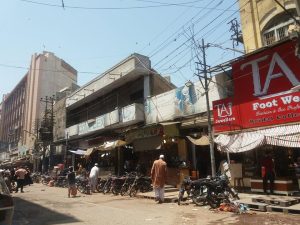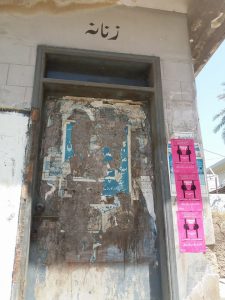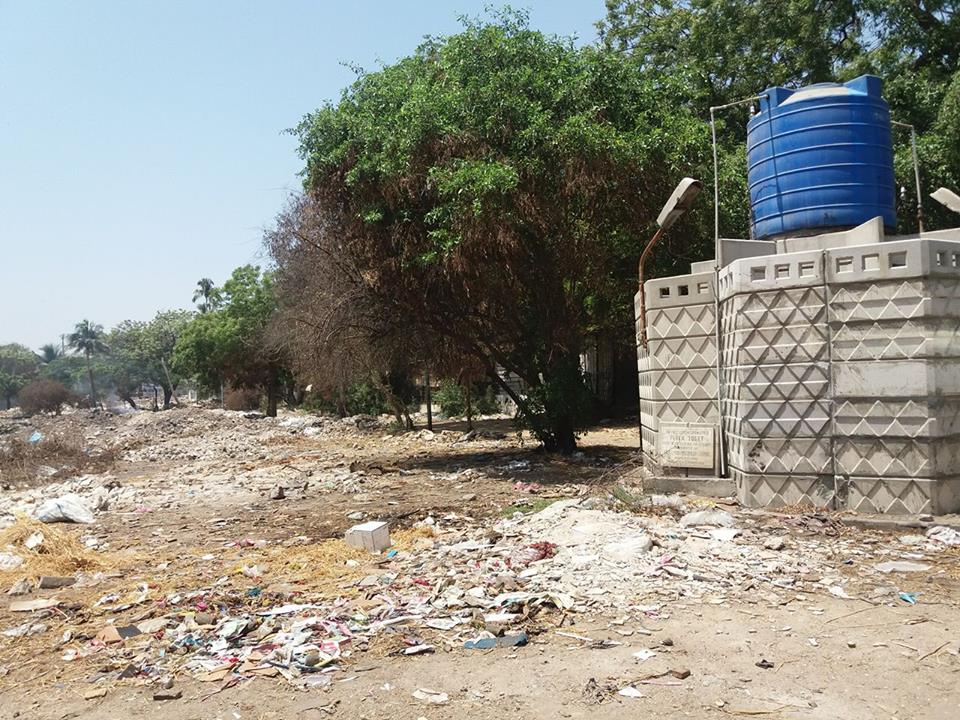Karachi: The hustle and bustle of men can be observed around a structure located in the heart of Jahangir Park in Karachi. The structure has no ceiling and has a water tank on the roof, with the words ‘public toilet’ (restroom) written on it.

This restroom is located near the ancient Empress Market, close to the bus stop and the market; several other bus stops as well as carts can be seen. All four restrooms are for both men and women, but News Lens Pakistan observed them for an hour and saw that they are rarely used by women.
Salim Masih, who is responsible for overseeing the restrooms, told News Lens Pakistan, “A fee of Rs.5 is charged for a single use, and an endless stream of men visits the restrooms throughout the day. It is men who come here most of the time, with the exception of one or two women who are waiting for their buses.”
The Citizen Police Liaison Committee built 44 units across the Karachi including this particular unit. The project was initiated by the CPLC in 1999 during which 200 public restrooms were to be set up, but only 44 have been established till now.
Central District Chief, CPLC Syed Atiqur Rehman told News Lens Pakistan that the Government should look into this issue as due to a lack of interest and attention on their part, philanthropists are the ones facilitating the common people. “Local bodies are aware of the need for public restrooms, but maybe they do not have sufficient funding for it and when they need to build a public restroom, they get in touch with the CPLC,” he said.

Lucky Star Bus Stop is situated about three kilometers from the Empress Market; this is where separate restrooms for men and women have been established by the Cantonment Board but the female restrooms are usually locked.
Different areas of the city, especially Landhi, Korangi and other sites where buses arrive and depart as well as a market of medical devices, are close to this locality. A fee of Rs.5 has been set for using the restroom, and according to the deployed crew, the women’s restroom has been closed for a long time due to unknown reasons.
Water Aid, an organization that provides sanitation and ensures access to safe water, claims that one in three women are ill, worldwide, due to unsanitary conditions. They fear harassment and physical attacks. They do not have a safe place where they can satisfy their sanitary needs; these figures can be observed in statistics of developing countries.

In Karachi’s leading Jamia Cloth Market, not a single restroom is available for women and they are forced to go to mosques for their needs. Almost everything related to women ranging from clothes to shoes, jewelry and everyday items, is sold in this market, visited by thousands of women on a daily basis.
Union Chairperson of Aram Bagh Furniture Market, Shahid Hussain, says, “There are no separate restrooms available for women in the market.” He aims to have a restroom constructed, but there is no space for one.
A tour of various markets throughout the city shows that there are no restroom facilities for women. Thousands of women shop from these markets daily.
Muhammad Rafique Jadoon, President of All Karachi Traders Organization, says that if women inquire about a restroom, they are directed to a hotel. He said, “There is a public restroom a short distance away, but no one knows about it and no signboard has been placed. Men usually go to mosques for their sanitary needs, but women face problems.”
According to a report by the Institution of Urban Resources Centre, which works for urban facilitation in Karachi, in the year 2015, Karachi’s population was 18 million which will continue to increase to 24.1 million by 2020. In such a populous city where women comprise about 40% of the population, there are almost no restrooms for women in public places.
Mr. Hakim Shah, President of Old Clothes Market Light House Traders Association, says: “Women account for 25% of our customers; yet there are no public restrooms for them.”
According to Water Aid, if proper sanitation, drainage, and cleaning were carried out in the world, the health and lives of 1.25 billion women can be drastically improved.
Zahra Aneesa, a young woman, says: “There are some restrooms located on Tariq Road and some other markets, but due to the abysmal sanitary conditions we would rather wait till we get home rather than using these restrooms.” She also said that restroom facilities in Karachi had stagnant conditions, which may contribute to the spread of various diseases. Hence, most women avoid using them.

In this regard, News Lens Pakistan had a talk with Prof Dr. Rubina Naqvi from the Department of Urology. She said, “If the restroom is not clean and a woman uses it, there may be a risk of them getting infected.”
Pakistan has been ranked 127th out of 162 countries in the development index of United Nations Development Programme (UNDP). The reasons for being low in the list are lack of clean water and inadequate sanitation.
According to Seemi Kamal, the founder of the Hisaar Foundation, “People think that women do not need to go to public restrooms, and women avoid such places as well.
Women avoid using restrooms in parks as they feel insecure because they think they are being scrutinised.”
Recently, local elections were held in Sindh in which 33% of women have been elected. Before this, the representation was 23%. Seemi Kamal said that she started working when the representation of women was adequate, but in her experience, she did not get her share in development funds.
In Karachi, it is mostly women who perform the duty of purchasing household belongings. According to a News Lens Pakistan’s survey, these women spend 20 minutes to four hours in markets.
Dr. Rubina Naqvi said that women drink less water due to a lack of restrooms.
“Karachi’s weather is humid; the body requires more water, hence more water is discharged as well. Kidney specialists recommend ten to twelve glasses of water a day. If someone left home and failed to satisfy their sanitary needs due to the unavailability of restrooms and did not drink water for the next six hours; large amounts of water will be discharged through their body and skin, due to which chances of kidney stones are high and the chance of infection are increased.” She also added that if pregnant women fail to satisfy their sanitary needs, they are at an increased risk of getting an infection.



